Iraq
Images of 9/11, the fighting in Fallujah, the capture of Saddam Hussein – all of these had a profound impact on our generation’s perception of Iraq. After the Arab Spring, the Islamic State had shaken the Middle East. Syria and Iraq were considered the strongholds of the terrorist organization, Mosul and Palmyra were places of utter destruction that had gone around the world. To this day, the security situation in Iraq remains volatile, with neighboring countries carrying out their conflicts on its territory. Since October 7, 2023, the situation in the Middle East has escalated once again. Despite everything, the situation in Iraq has stabilized to some extent, and more and more tourists are exploring Baghdad or southern Iraq – which was an absolute no-go area just a few years ago.
When we traveled by boat from Kuwait to Khorramshahr in Iran in 2017, we drove along the Iraqi shore – old bunkers and capsized warships from the Gulf Wars left us speechless. Behind these war relics lay a deceptive landscape of marshes. We were determined to return and see more of this country.
The trip to northern Iraq – to the autonomous region of Kurdistan – is one of our most exciting and thrilling journeys. In 2019, this was the only region of Iraq that was considered relatively safe. At first glance, it was a completely foreign world that we were entering. After just a few days, we realized that this world was closer to us than it had seemed.
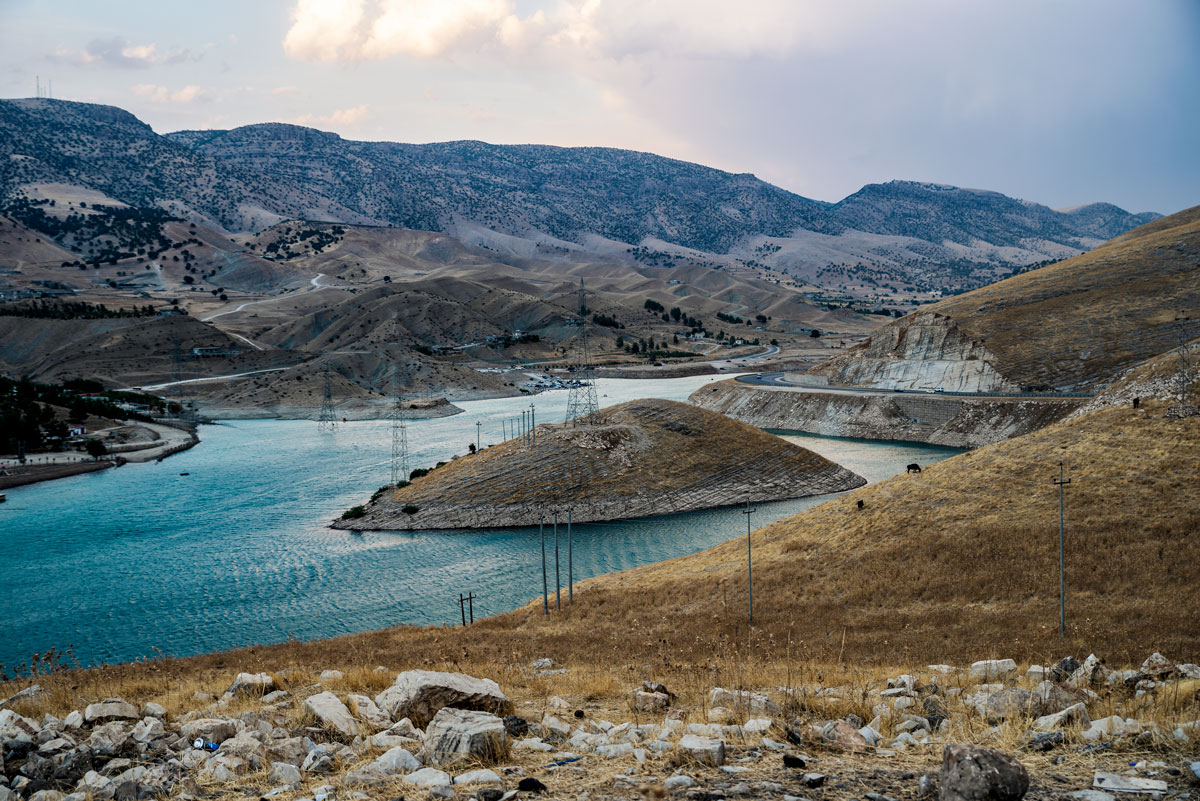
As our plane touches down on the runway in Erbil, a dull feeling creeps over us. Was it the right decision to come here? Posters at the airport warn of terrorist activities and call on people to report any suspicions immediately. We take the bus out of the Green Zone, the hermetically sealed security zone around the airport. We are the only foreigners and will remain so for the next few days. Dozens of pairs of eyes scrutinize us.
We meet Abdullah in the waiting hall. We met him through couchsurfing and he immediately agreed to help us during our stay and show us around his country. We get into his huge SUV. Who is this man? Is he really just a friendly helper? He says he works for the embassy of a government (which we are deliberately not naming here). We have a quick chat during the drive, then he lets us out in front of our hotel. We arrange to have dinner together. “The city is safe, you can move around freely here,” he shouts as we say goodbye.
So off we go. At over 50° Celsius, the city is empty. Stores are closed, hardly a passer-by or car on the streets. We find a small store that serves us sandwiches, then we walk to the citadel of Erbil. More deserted streets, empty house fronts. Spooky. A mall is blocked off with makeshift barricades. Furniture and barriers stand in front of the main entrance. Then we recognize masked men. They are wearing protective vests and carrying heavy assault rifles. We give the mall a wide berth and soon afterwards come across a second, similarly guarded shopping street. We are told that the security situation in Kurdistan is so good because the security precautions are excellent. We later learn that soldiers guard public places from bombers when the stores are closed.
We reach the historic heart of the city. Erbil is the longest inhabited settlement on earth. People have settled here since the dawn of civilization. We cross an impressive square with water features. The citadel itself consists of ancient walls and watchtowers. Everywhere we go, eyes follow us. A girl from Baghdad – she is visiting here with her parents – wants a selfie with us. Young men keep coming up, talking to us in a few words of English, shaking hands with Chris and pulling out their cell phones to take a photo with us. If we stand still for too long, a crowd of dozens (!) of men gathers around us within a few minutes. We find it difficult to tell where curiosity and hospitality end and inappropriate harassment begins. We quickly move on.
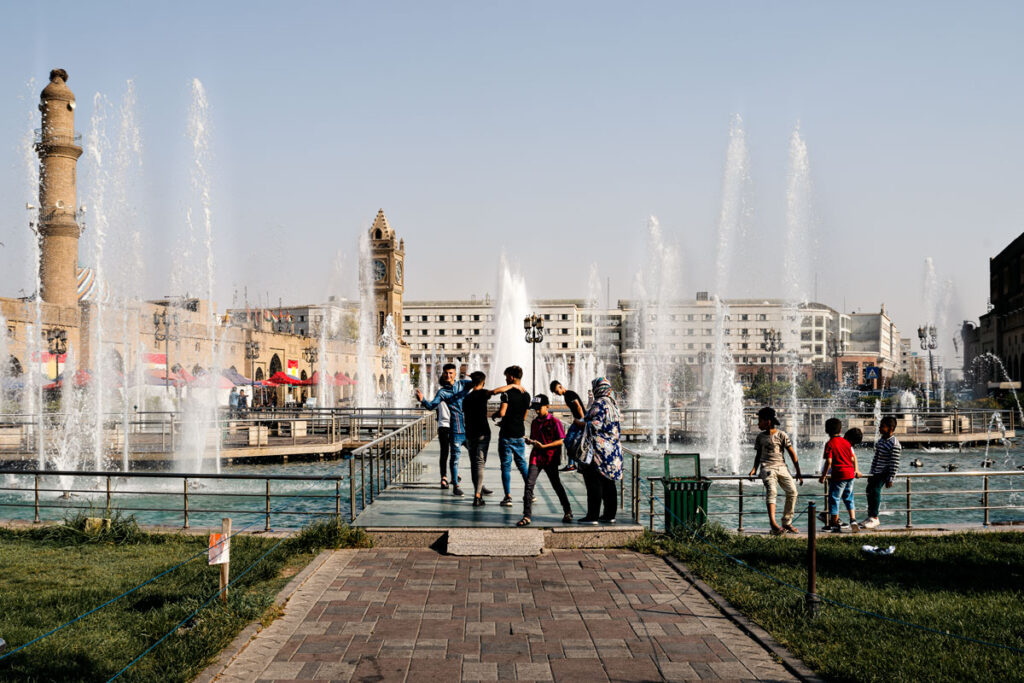
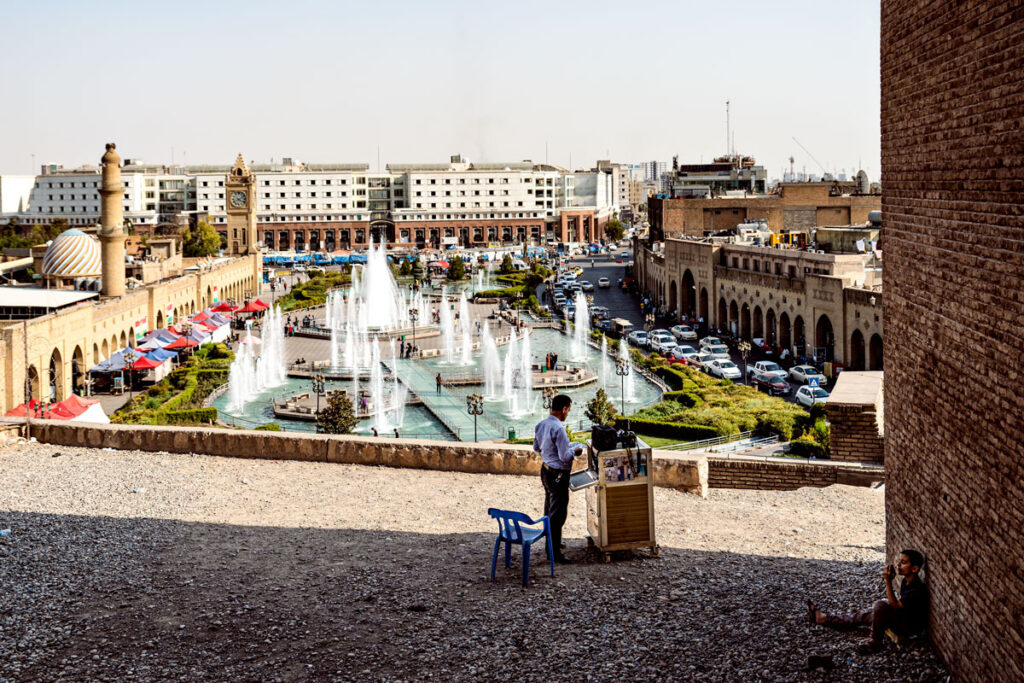
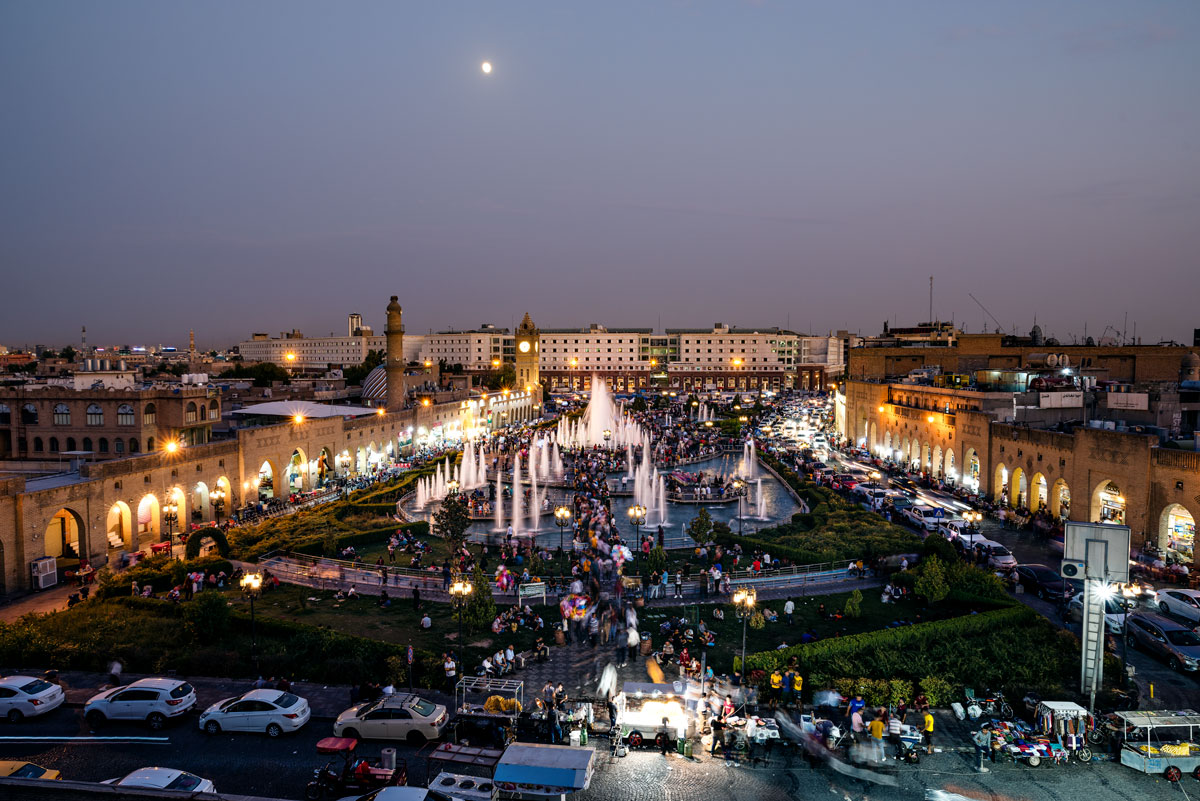
It’s so hot that we barely walk two hundred meters before we have to take a big drink of water. Fortunately, there are free drinking water dispensers everywhere.
We arrive at a park with a withered lawn. It is now afternoon and the first people are venturing outside. Groups of men and families. We only see women accompanied by their parents. A few young couples too. Photographers with old-fashioned cameras take pictures of them. There are snacks and toys for children for sale everywhere, a cable car runs through the treetops of the park. Dead fountains, little shade. Families picnic on the ground. They grill meat and smoke water pipes. Their eyes follow us wherever we go. Slowly, the nervousness and unease fall away from us. We begin to feel safe.
Shortly afterwards, we meet our new-found friend Abdullah. Together we drive to a suburb of Erbil and have dinner in an Italian restaurant with his friend from Basra. We are served excellent pasta, accompanied by a water pipe that goes straight to our heads like cannabis and dulls our senses. We learn a lot about the country, the culture and the “wild” Kurdistan, which wants to be an autonomous region against all odds.
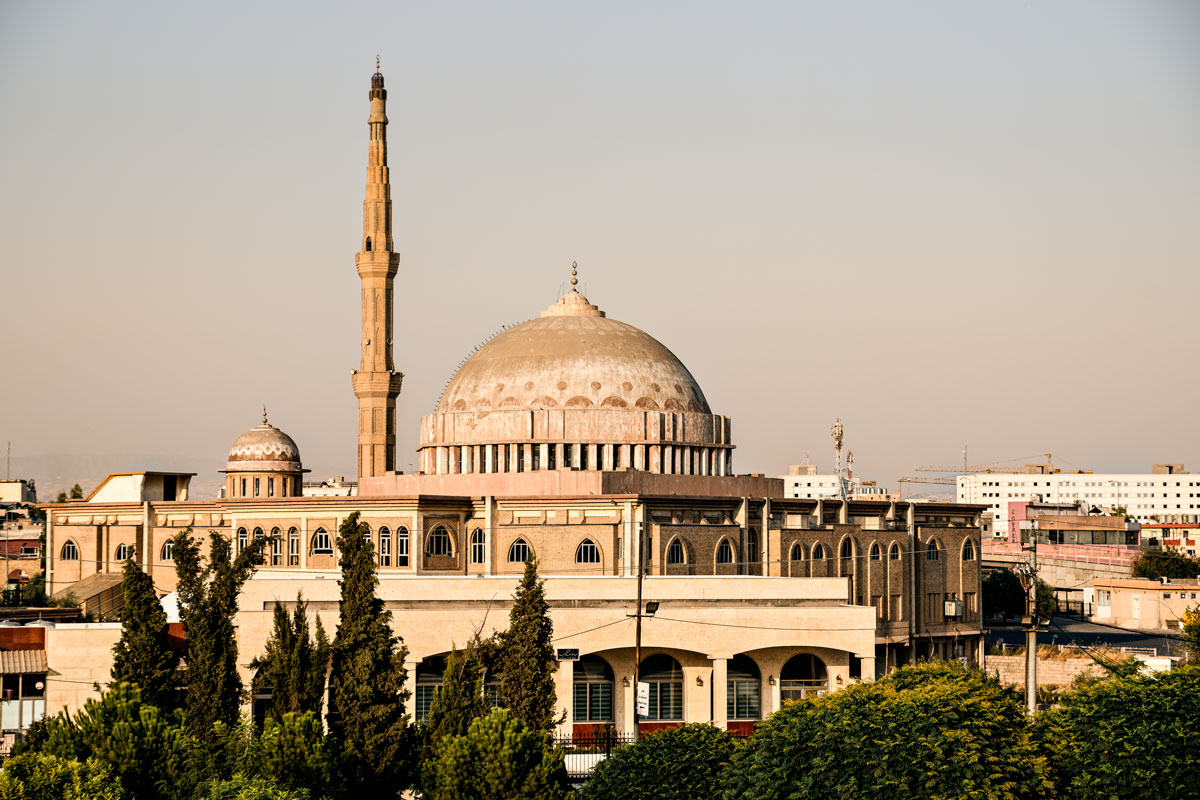
Abdullah picks us up from our hotel the next morning. The sun is already high and blazing mercilessly overhead. Together with his cousin, we drive towards Soran in the mountains. We follow the historic Hamilton Road, which the eponymous New Zealand engineer A. M. Hamilton had built through the gorges of the Kurdish mountains around 100 years ago.
We stop in a small village and have a typical breakfast in a restaurant: Yogurt, fresh bread, cheese, olives and a porridge made from chickpeas. Served with sweet black tea. Strengthened, we follow an ice-blue river further and further towards the Iranian border. We have to stop again and again because the landscape is so breathtakingly beautiful. Deep canyons, high rock walls. In spring, everything should be green and blossoming here. Now, in August, the ground is dry and dusty. We stop at the Bekhal waterfall for a long lunch and a water pipe. The waterfall is a popular destination. Children and men crowd close together to refresh themselves in the cool water. The women wait in the shade of the trees. There are ice cream vendors and souvenir stores. But the biggest attraction is us.
In the afternoon, Abdullah has another surprise for us: he spontaneously invites us to his uncle’s house, who lives close to the Iranian border. There we are welcomed and entertained like kings. Nuts, baklava and chocolate are served. We ask about life here in this village in the Kurdish mountains. We ask about life in Iraq in general. Abdullah translates for us. Tea is poured again and again. We thank him warmly when we leave the house after about an hour.
Before we return to Erbil, we drive up to a rocky plateau. A small amusement park has been built up here. Large coaches from Baghdad park here. The buses were once imported from Germany and the German license plates have not been removed. The sun is approaching the horizon and will soon set, plunging this rugged and mountainous land into darkness.
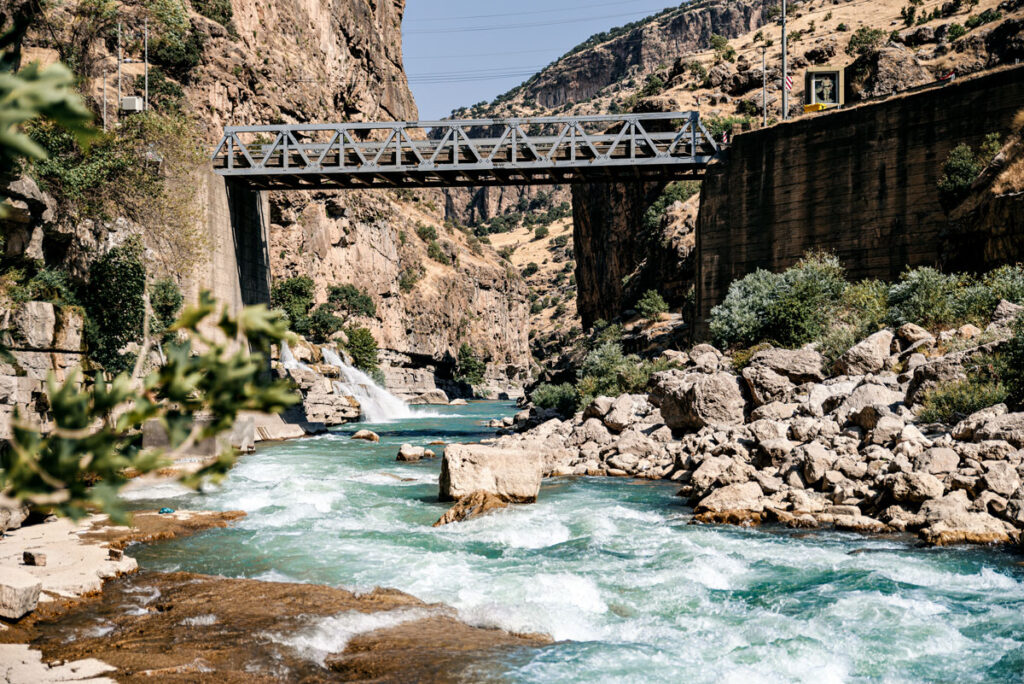
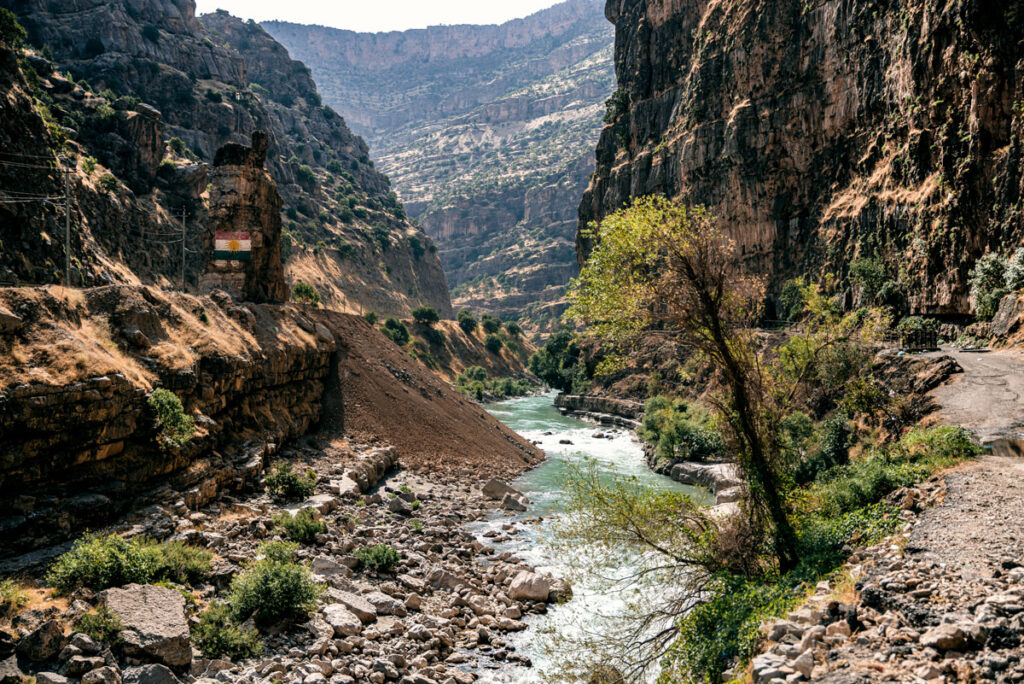
Mosques dominate the face of cities. There are the small ones, with a tiny minaret and a prayer room just big enough for a handful of people. There are the huge ones, with golden chandeliers, hand-woven carpets and space for thousands of worshipers. There are the dilapidated ones in barely inhabited areas and there are the new ones, air-conditioned, with immaculate sanitary facilities.
In the light of the evening sun, we visit the Rashad Mufti Mosque on the outskirts of Erbil, right next to a multi-lane city road. The marble floor reflects the red-burning evening sky. Tired men come to pray. They look at us curiously, then disappear inside the mosque. We enjoy the peace and quiet of the place, despite the cars speeding past. The muezzin begins to sing.
Then the religious contrast: pizza in a shopping mall. The sacred halls of capitalism offer material happiness in the here and now. The perfect complement to eternal peace of mind in the afterlife.
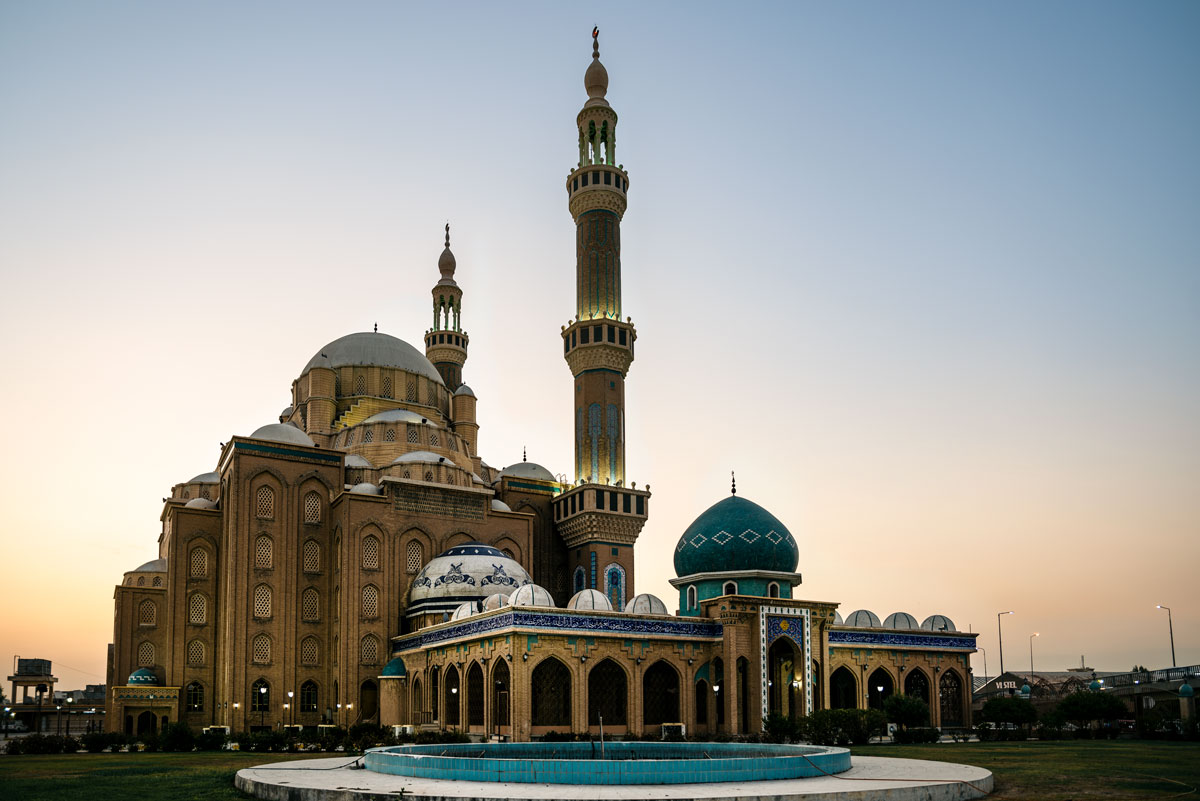
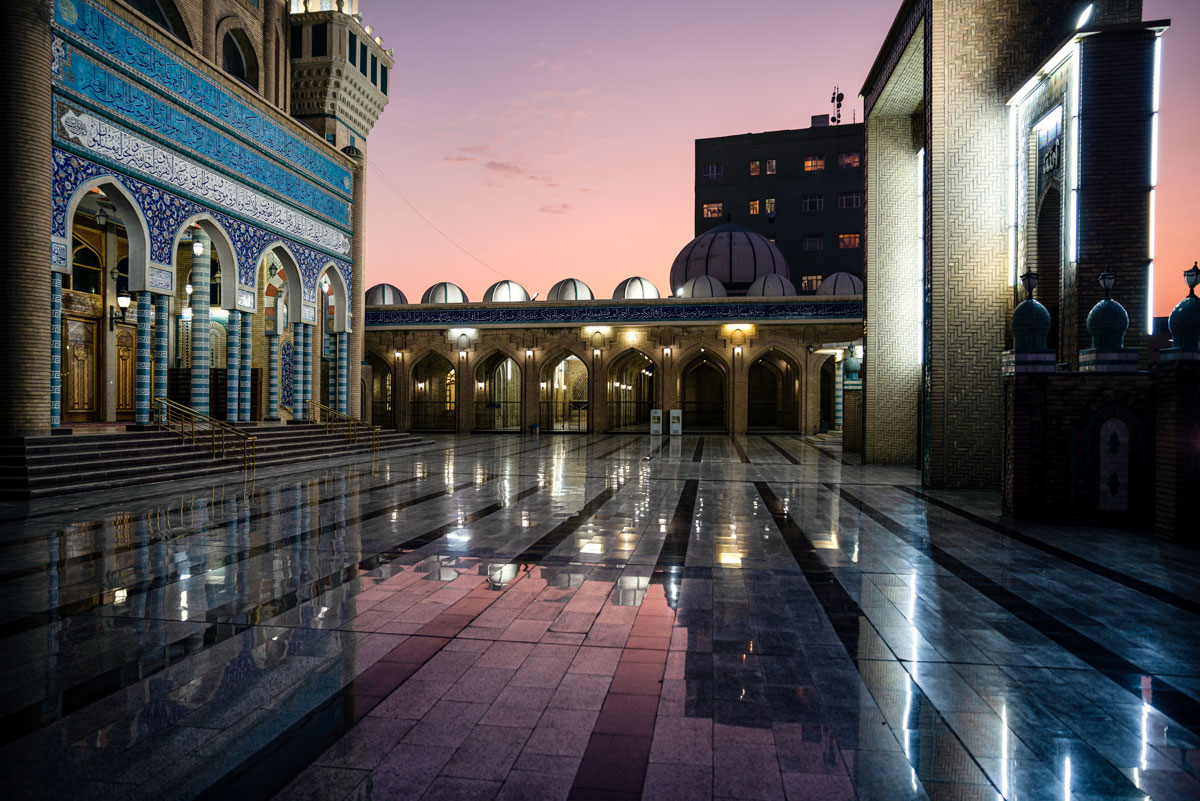
In the morning, we take a cab to the airport – not to start our return journey, but to hire a car. After passing through numerous security gates and checks, we arrive at the car rental company. We have booked a very small car. The man at the counter says he doesn’t have anything like that. We would get a free upgrade. Shortly afterwards, we set off for the city of Sulaymaniyah in a huge Toyota Fortuner SUV.
The road leads through barren desert. Again and again – without any signs – deep pits suddenly appear in the road ahead: unsecured construction sites. We pass numerous Peshmerga border controls, sometimes being thoroughly examined, sometimes simply waved through. Sulaymaniyah itself is a city of millions – but at this midday it seems like a village. The market is busy, the traffic is heavy. Nevertheless, the side streets are peaceful and many places are deserted. First we head for the war museum. Old tanks from the second Gulf War. The persecution of the Kurds is told in impressive pictures. The fight against IS is heroized. Sulaymaniyah was spared from the fighting. Many people fled here from Kirkuk and the surrounding regions.
We stop off at a shawarma restaurant for lunch. In Sulaymaniyah, we have the feeling that we are less harassed and stared at. Although the city certainly doesn’t see any more foreign tourists than Erbil, we don’t stick out like a sore thumb here.
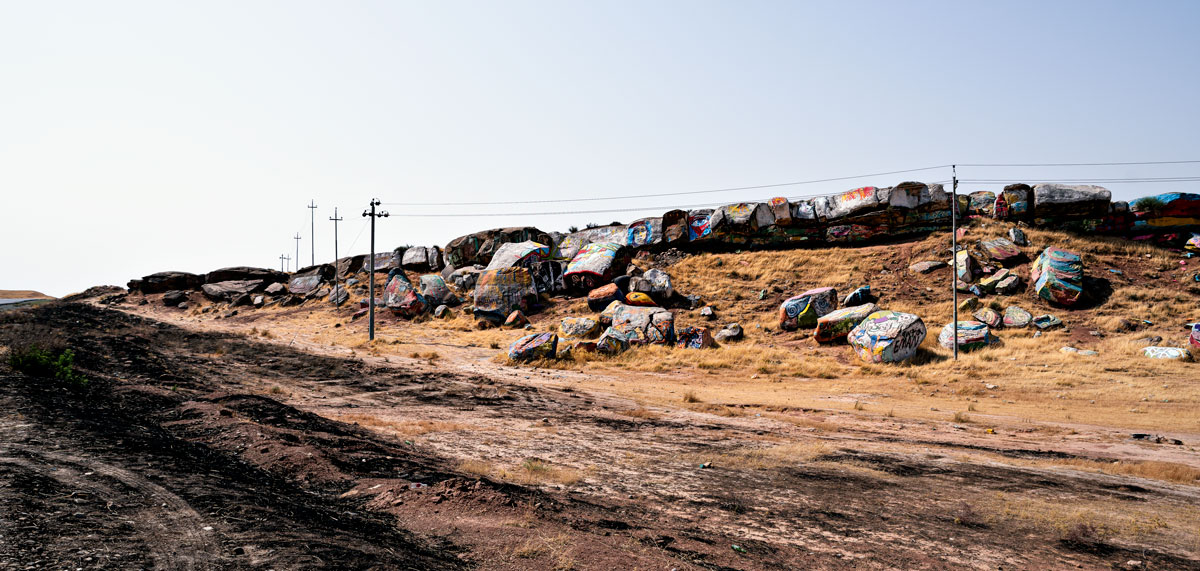
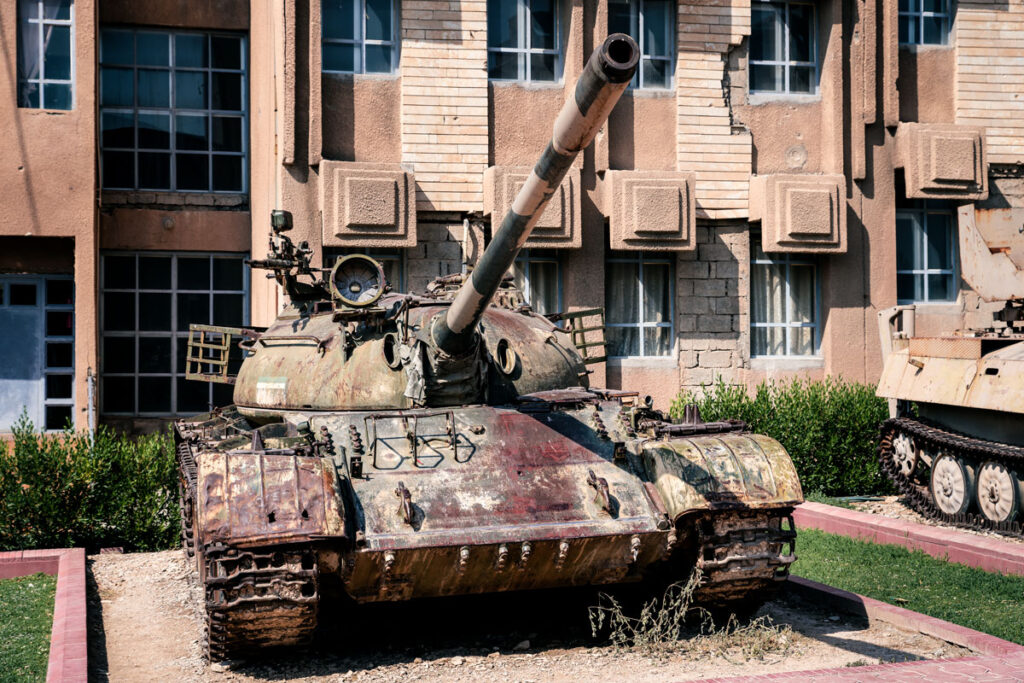
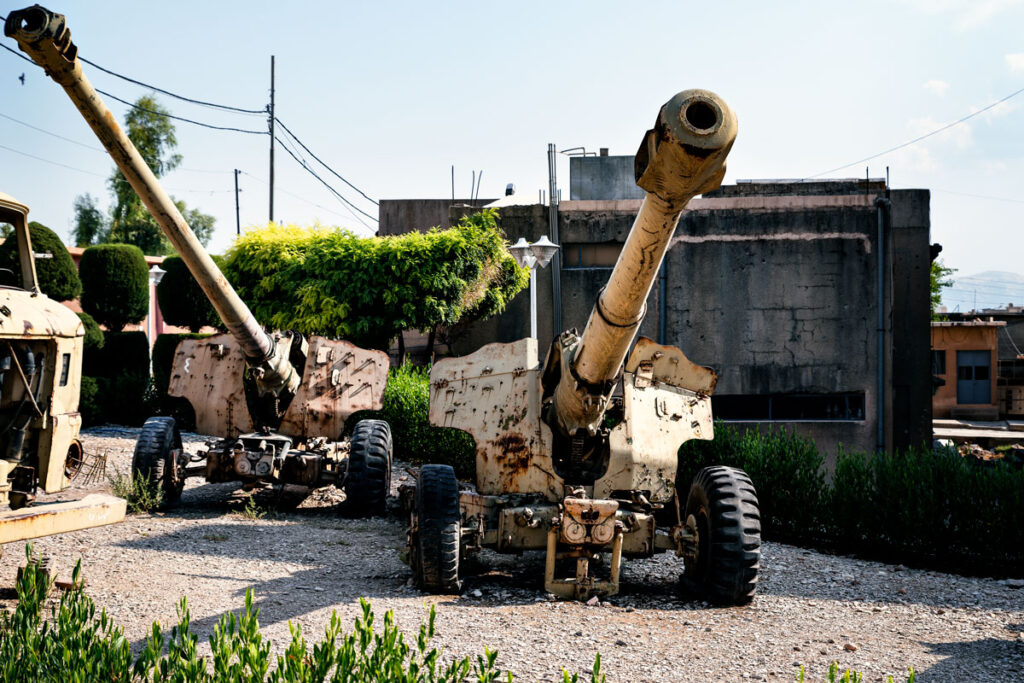
It’s getting late in the afternoon. A storm front is gathering on the horizon. We stroll along sandy roads through a small village on the shores of Lake Dukan. A huge dam has dammed up the water in this otherwise dusty and dry area. A herd of curious cows trots along with us between the houses. A child watches us from the shadow of a house entrance. Otherwise, there is peaceful silence. A few men are washing their cars in the water. Boys and girls splash around. The first drops fall and we make our way back to Erbil.
A short time later, complete darkness falls over us. We speed along country roads through the desert, with no street lighting anywhere around us. The rain turns into a storm and takes away our visibility. We remember with a sinking feeling the deep construction site trenches that cut up the roads without warning on the outward journey. Although we are taking a different route, who knows what the condition of this road is like? What’s more, the brakes on our Toyota were in urgent need of a service. The car had responded to an emergency stop on the outward journey with a metallic screech and an unpleasantly soft brake pedal.
At some point, we pass the first Peshmerga road checkpoint, followed shortly afterwards by another. We made it and arrived alive in the Erbil area. It had been more luck than anything else.
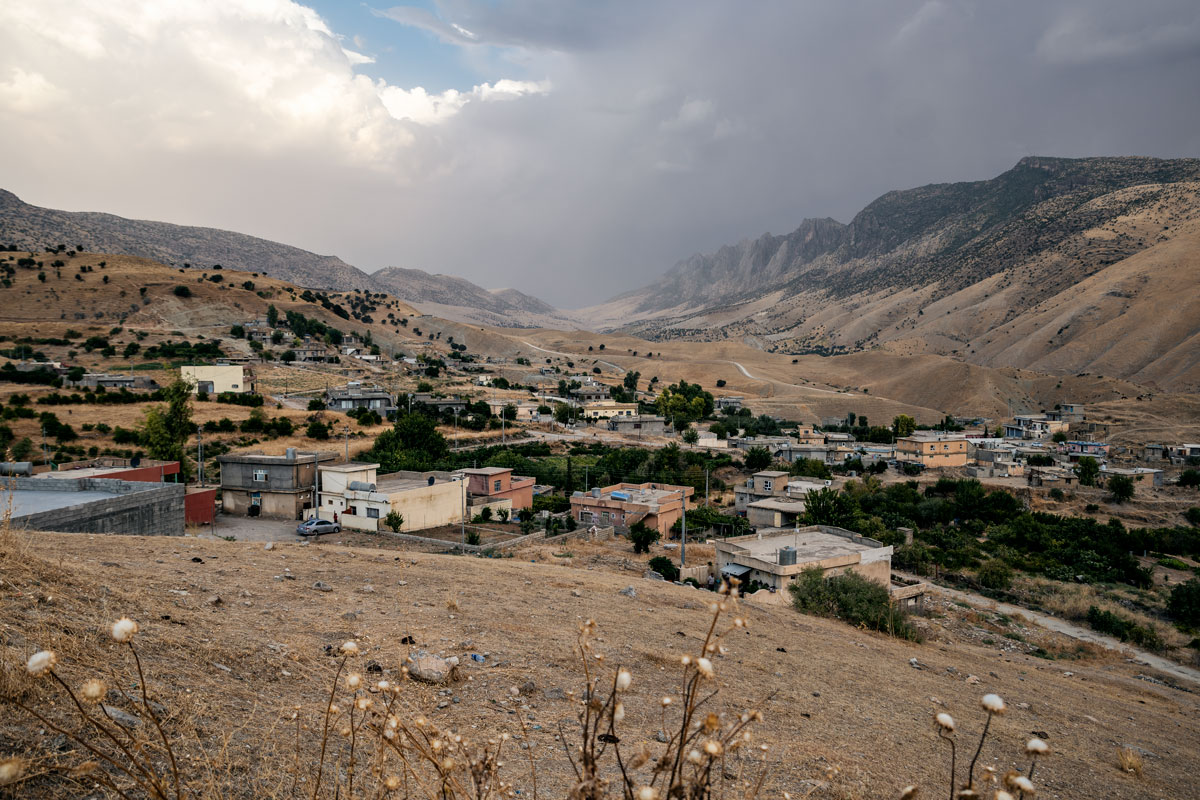
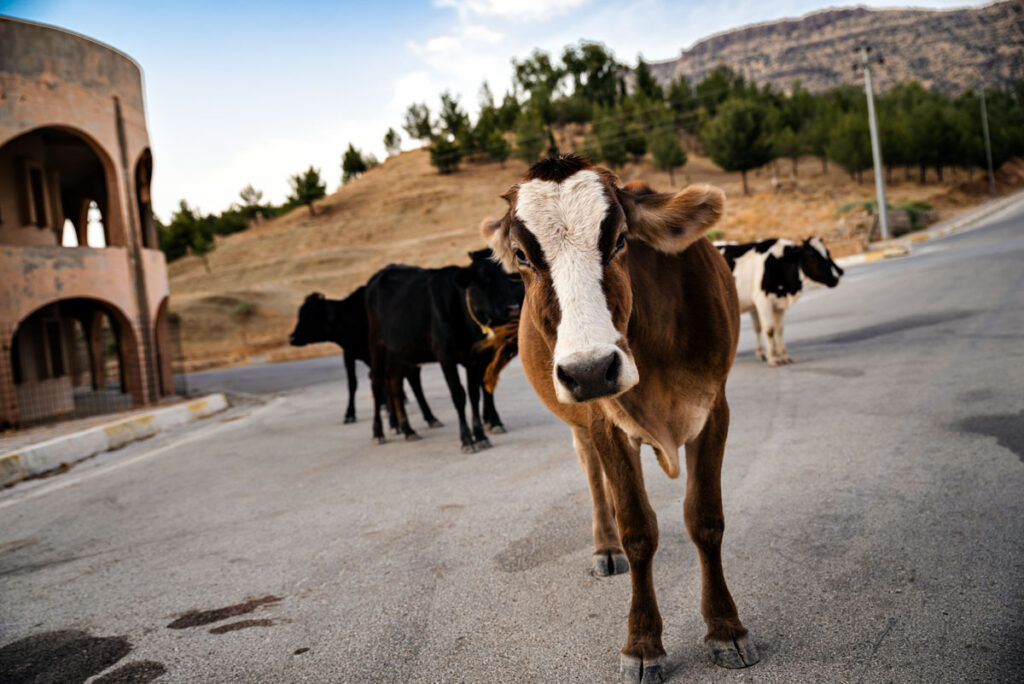
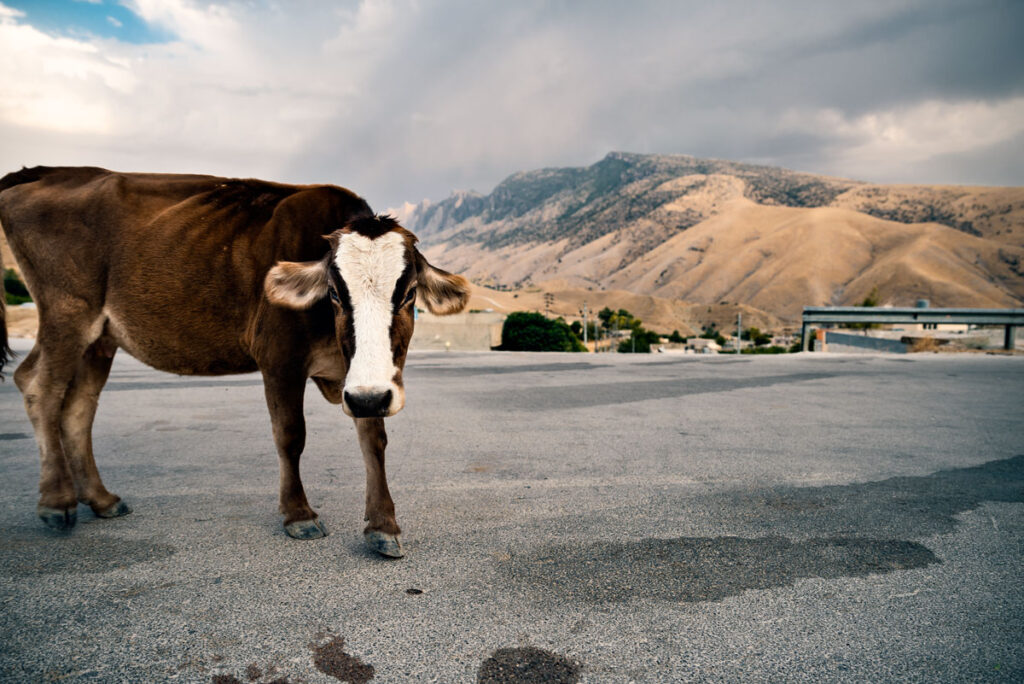
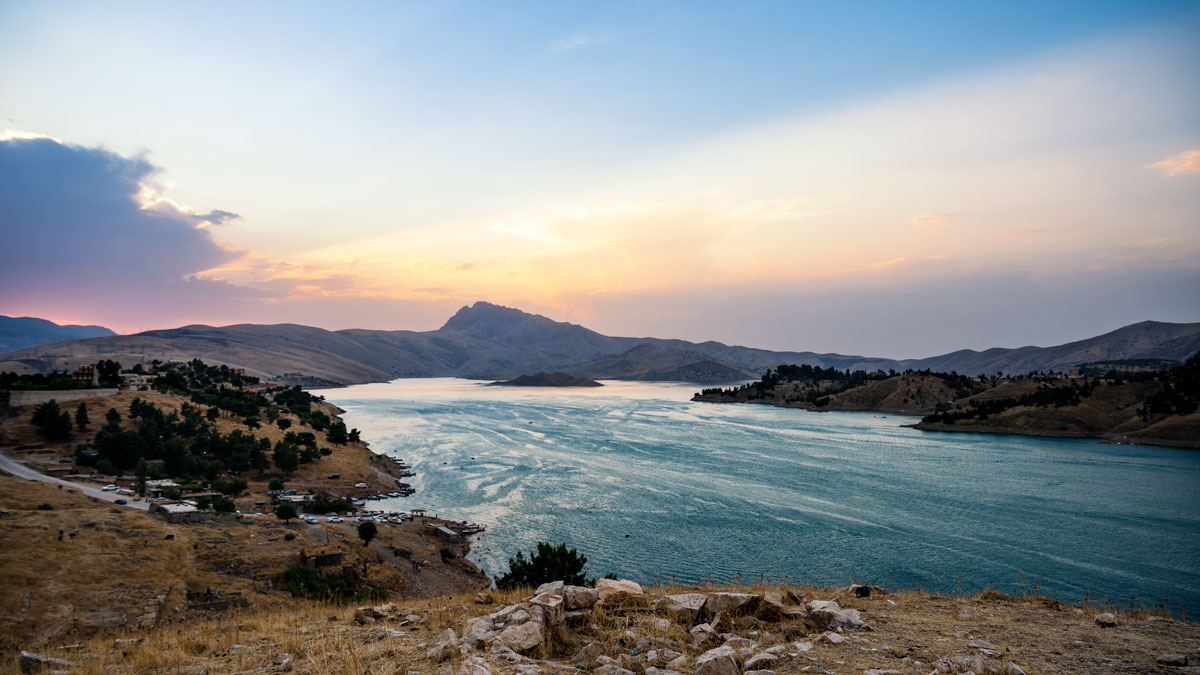
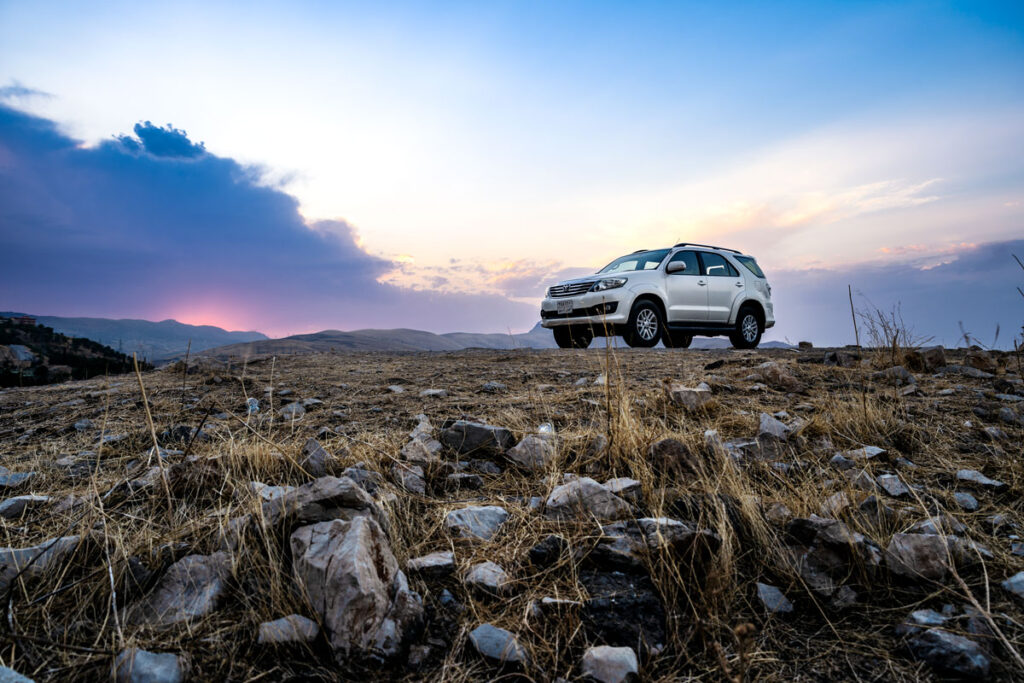
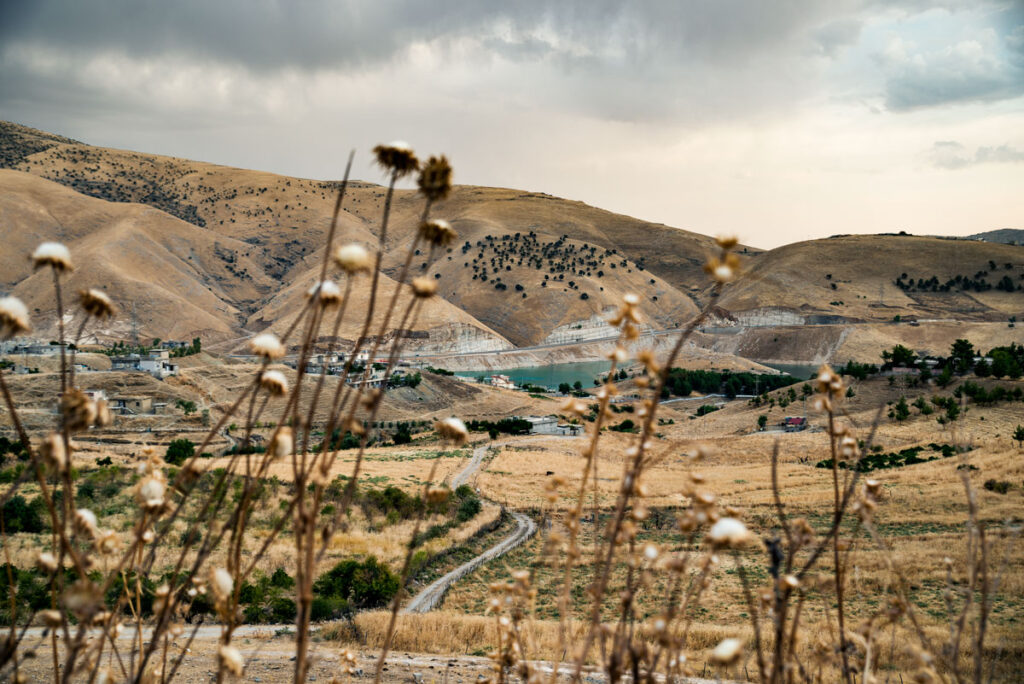
The next morning, Abdullah picks us up from our hotel in Erbil and we drive to a restaurant for a farewell breakfast. His wife and young daughter are also here – but they are sitting in the family area on the second floor. We don’t get to know them. Abdullah’s friend from Basra is also there. After dinner, they take us to the bus station, where we say goodbye. We drive to the Turkish border via Dohuk. It is common practice for Turkish border officials to search Iraqi Kurds very carefully and make them wait a long time. We wait around six hours on the bus with the other travelers before we are allowed to enter Turkey. We drive along the Syrian border to Kızıltepe and from there to Diyarbakır, where we arrive at around five in the morning.
The journey to Kurdish Iraq was more intense and formative than any other trip. The initial fear of the unknown very quickly gave way to a basic trust in the hospitality of the people. Although there were always moments when we were surrounded by dozens of men, there was always someone who pulled us out of our predicament with their open-heartedness. Certainly, Iraq is a crisis region and no place for a headless adventure. But it is a country so incredibly rich in culture and hospitality that it would be a shame never to see it.
Info about our trip
A trip to Iraq might not appeal to everyone. And above all: the security situation can change overnight, so you shouldn’t plan too long-term. In general, however, the country is incredibly exciting and has a lot of history and culture to offer – after all, Mesopotamia is considered the cradle of civilization. And in Kurdistan you will also find exciting sites and history, unfortunately coupled with a cruel recent past and the persecution of the Kurds. It is terrible to see how a country has to serve as a stage of war for external conflicts in neighboring countries. Iraq has been repeatedly affected by the war in Syria, the fight against IS and, most recently, the conflict between Israel and the Lebanese Hezbollah.
If you decide to travel to Iraq, read up on the security situation and current political developments. Don’t expect a tourist infrastructure – it doesn’t exist. We can highly recommend the Facebook group Iraqi Travelers Cafe. There you can exchange ideas with other Iraqi travelers and find helpful tips. In any case, get ready for an unforgettable trip!
Currently, you will receive a visa on arrival if you enter the country via Baghdad airport. If you enter via Kurdistan in northern Iraq, you will not be able to travel on to the rest of Iraq – the Kurdish visa is really only limited to Kurdistan. It is also possible to enter the country with your own car, but your passport may be withheld for security reasons. Accordingly, you can only re-enter the country at the same border crossing. Transit is therefore not possible.
Iraq is anything but cheap, especially when it comes to overnight stays. If you stick to local restaurants and stores, you can at least save money here.
Iraqi cuisine is naturally very meat-heavy and rather simple. In everyday life, people like to eat sandwiches and fast food, while the richer Iraqis love Italian food. Pulses, rice and lots of lamb are traditional. A boiled lamb’s head soup is very popular in the Kirkuk region. You can also eat grilled fish in Baghdad and in the south of Iraq. We have already described the simple but very tasty breakfast (bread, sheep’s cheese, olives, yoghurt, chickpeas). In general, eating in Iraq is a sociable affair. As a rule, the men are among themselves, the women and children sit apart or in a separate room. Water pipes are smoked and black, sweetened tea is drunk everywhere.
Hotel prices in the main cities in Iraq are around 60-100 dollars upwards. We would definitely spend a few dollars more to book a better hotel that is in a safe area and can help you with all the necessary information and services.
We don’t want to write much about the security situation itself. Iraq is to a large extent still a place of war and in the long term all foreign offices will advise against tourist travel and issue strict warnings. There are real and very specific dangers from acts of war and terrorism. In 2022/2023, the situation – especially in central and southern Iraq – was fairly stable. Currently, the entire Middle East is on fire again. So make sure you are well-informed before rushing into an adventure. Don’t forget: there is hardly any tourist infrastructure and you will be dependent on outside help. It doesn’t hurt to make a few acquaintances and friends in Iraq in advance, as these are real door openers on the ground. Fortunately, this shouldn’t be a problem at all – just use social media.
Even if the Iraqis themselves are very child-friendly, this is definitely not a country you should travel to with your children. Not only is the security situation impenetrable, but emergency medical care is also inadequate.
Kurdistan is surprisingly easy to explore in a rental car. We rented our car from Hertz at the airport. The service was good, but unfortunately our car was in poor technical condition.
Otherwise, you can get around between the cities cheaply with shared cabs or intercity buses. Alternatively, you can hire a private driver (expect to pay around 100 dollars a day).
- You can find everything you need to know about the country’s history in the Beck series Geschichte des Irak: Von der Gründung 1921 bis heute by Henner Fürtig
- Karen Radner takes you on a journey through Iraq’s early history in Mesopotamien: Die frühen Hochkulturen an Euphrat und Tigris
- Anyone interested in the history and fate of the Kurds should definitely read Die Kurden: Geschichte, Politik, Kultur by Martin Strohmeier and Lale Yalçin-Heckmann
- Recently, a few travel guides to Iraq have been published, so far we have had good experiences with the Bradt travel guide Iraq: The Ancient Sites & Iraqi Kurdistan by Geoff Hann
